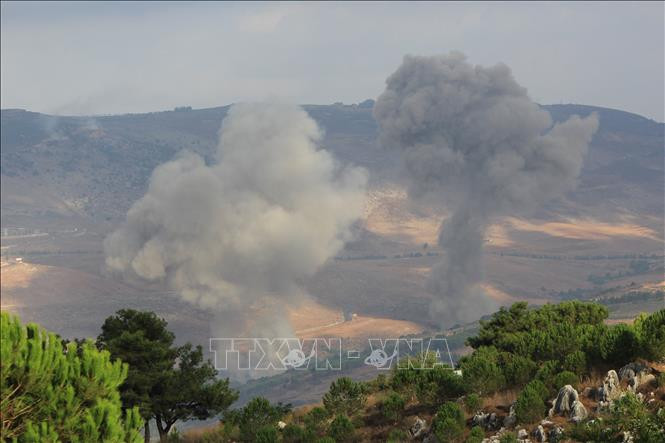The conflict between Hezbollah and Israel continues to escalate dangerously after more than 11 months, with the intensity and scale of retaliatory attacks increasing.

The Israeli military said its air strikes on September 23 hit more than 1,300 Hezbollah targets in Lebanon within 24 hours.
Meanwhile, a Lebanese government source said Israeli airstrikes on its territory have killed at least 492 people and injured at least 1,645 others. This is the bloodiest attack since the Gaza war broke out last October.
As the latest developments in the Middle East threaten to push the entire region into a full-scale war, Arab and Muslim countries on September 23 called on the international community, especially influential countries, and the United Nations (UN) to intervene immediately to prevent the conflict from escalating into a broader war.
In a statement, the Egyptian Foreign Ministry called for a peaceful solution to the crisis, an immediate end to escalation and a fair implementation of United Nations Security Council (UNSC) Resolution 1701, as well as giving room to diplomatic solutions, as military escalation will only worsen the situation.
The statement denounced any violation of Lebanon's sovereignty and territory and condemned Israel's dangerous escalation. The statement said Egypt had previously warned of the dangers posed by Israel's actions in Gaza and that an escalation of the conflict could push the Middle East into a full-scale war.
On the same day, Egypt and Lebanon issued a joint statement calling on the UN Security Council to issue a binding resolution demanding that Israel immediately end its aggression against Palestinian and Lebanese territories.
The statement was made after a meeting between Egyptian Foreign Minister Badr Abdelatty and his Lebanese counterpart Abdallah Bou Habib on the sidelines of the 79th session of the UN General Assembly in New York (USA).
Mr. Abdelatty and Mr. Bou Habib discussed the serious developments in the Middle East, strongly condemning Israel’s aggression against Lebanese territories. The two foreign ministers also called on influential countries to take decisive action to prevent the conflict from escalating into a full-scale war in the region. Mr. Abdelatty warned that any threat to Lebanon’s security would endanger the stability of the entire region.
The foreign ministers of Egypt and Lebanon stressed that the only viable solution to the current Middle East crisis is to achieve a comprehensive ceasefire, end attacks on Gaza and Lebanon, as well as resolve outstanding issues between Israel and Lebanon.
Meanwhile, Iraqi Prime Minister Mohammed Shia Al-Sudani on September 23 called for an urgent meeting of Arab leaders on the sidelines of the UN General Assembly after Israel intensified its attacks on Lebanese territory. Mr. Sudani stated: "Iraq calls for an urgent meeting of Arab leaders to consider the consequences of Israel's aggression on the Lebanese people as well as joint efforts to end the conflict."
Also on September 23, Türkiye warned that Israel's attacks on Lebanon threaten to plunge the Middle East into greater chaos. In a statement, the Turkish Foreign Ministry stressed that Israel's attacks on Lebanon mark a new phase of conflict that risks plunging the entire region into chaos.
Turkey called on the international community to intervene to prevent the conflict from spreading in the region. "The international community and all organizations, especially the UN Security Council, have a responsibility to maintain international peace and security and must take necessary measures to prevent the conflict from spreading," the Turkish Foreign Ministry said in a statement.
Speaking to reporters on the sidelines of the 79th session of the UN General Assembly on September 23, Iranian President Masoud Pezeshkian stressed that a full-scale war in the Middle East would not benefit anyone in the world, affirming that Tehran has made efforts to exercise restraint to ensure regional peace.